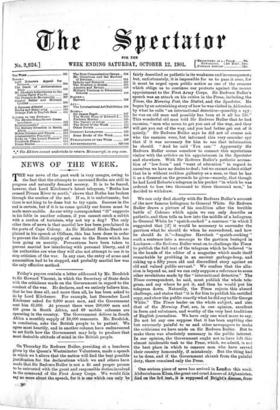We can only deal shortly with Sir Redvers Buller's account
of the now famous heliogram to General White. Sir Redvers Buller draws a picture of his condition after the teriible battle of Coleuso which again we can only describe as pathetic, and then tells us how into the middle of a heliogram to General White he " spatch-cocked " a sentence "in which'I suggested that [if] it would be necessary to surrender the garrison what he should do when he surrendered, and how he should do it."—Imagine Havelock " spatch-cocking " such a sentence into a message to the garrison besieged in Lucknow.—Sir Redvers Buller went on to challenge the Times to publish the full text of the telegram which he believed " is in the hands of the editor of a magazine which made itself remarkable by grubbing in an ancient garbage-heap, and raking up a fifty years old and discredited story against an old and valued public servant." We confess that the allu- sion is beyond us, and we can only suppose a reference to some other revelations made by the " international The Times correspondent, he said, must publish' the whole tele- gram, and say where he got it, and then he would put his telegram down. Naturally, the Times rejects this absurd challenge, and states that " it is for him to publish his certified copy, and show the public exactly what he did say to Sir George White." The Times leader- on the whole subject,' and • also that of the Morning. Post,- are, in our, opinion, excellent in form and substance, and worthy of the very best traditions of English journalism. We have only one word more to say. Do not let any one suppose that it has been anything else but extremely painful to us and other newspapers to make the criticisms we have made on Sir Redvers Buller. But to make them was absolutely necessary in the public interest. In our opinion, the Government ought not to have left this almost intolerable task to the Press, which, we admit, is not the best place in which to censure men who have served their country, honourably, if. mistakenly. But the thing had to be done, and if the, Government shrank from the painful duty, there remained only the Press.














































